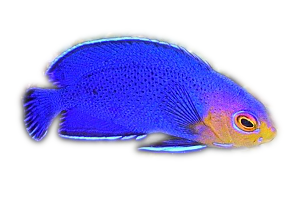
By Bob Goemans

Likely Reef Tank Suitable
Likely Fish-Only Tank Suitable
Range: Indo-West Pacific Ocean: Indonesia.
Size: 4 inches (10 cm)
Natural Environment: Inhabits shallow protected reefs and usually found at depths between 20 – 65 feet (6 – 20 m) where it feeds on zooplankton.
General Husbandry: Rarely seen in the trade with the male having a reddish-orange body and head with long filaments on its dorsal. Females and juveniles are somewhat subdued. Colors vary depending upon the age of the specimen, collection areas, and breeding timeframes.
Can be maintained in reef or fish-only aquariums that should have ample crevices and caves, and peaceful tankmates. Should not be kept with more aggressive fishes, e.g., dottybacks and some damsels.
As to diet, will eat most regular aquarium foods, e.g., finely chopped various frozen or fresh meaty foods such as mysis, squid, fish flesh, shrimp, clam, etc., and should be offered two to three times daily.
Taxonomy:
Order: Perciformes
Suborder: Labroidei
Family: Labridae
Genus: Paracheilinus
FYI: Males are usually larger than females and mostly differ from females in coloration.
Best maintained with several females. One male per aquarium.
They don't bury themselves in the sand at night, as do many other wrasses. Instead, they wedge themselves into a rock crevice.
They usually make good reef aquarium inhabitants if supplied with ample crevices and caves.
Quite hardy.
If harassed or frightened, may jump out of uncovered aquariums.
Experience Level: Intermediate
Temperament: Peaceful
Diet: Carnivore
Coral Safe: Yes
Fish Safe: Yes
Invertebrate Safe: Yes
Acclimation Time: 30 minutes+
Aquarium Environment: Reef or fish-only aquarium
Tankmates: Peaceful
Minimum Tank Size: 50 gallons
Temperature Range: 74 - 80°F (23 – 27°C)
Specific Gravity: 1.020 - 1.026
pH: 8.0 - 8.5
